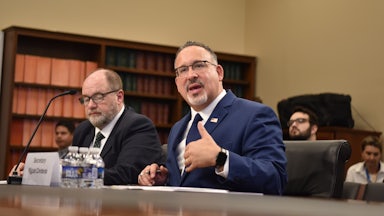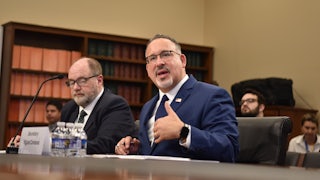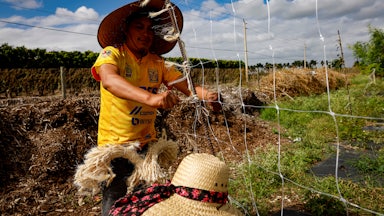At the end of April, the Supreme Court heard oral arguments in the case of Brandi Levy, a high school cheerleader, who posted “Fuck school fuck cheer fuck softball fuck everything” to Snapchat in 2017 and was kicked off the team for a year. “The words were superimposed over a photo showing B.L. and her friend with their middle fingers raised,” members of her legal team explained. The court’s ruling in this case could potentially disrupt the established principle that students do not lose their right to free speech “at the schoolhouse gate,” as the court ruled in Tinker v. Des Moines in 1969. Mother Jones called Levy’s case “the most important student free speech case to come before the Supreme Court in a half-century.”
One notable figure on today’s free speech beat, Michael Powell of The New York Times, surely missed an opportunity to highlight this case in his story, published this weekend, on the alleged wavering of First Amendment defense at the American Civil Liberties Union. In Powell’s telling, the organization is locked in an unprecedented, perhaps irreconcilable struggle between free speech and social justice. “Its national and state staff members debate, often hotly, whether defense of speech conflicts with advocacy for a growing number of progressive causes, including voting rights, reparations, transgender rights and defunding the police,” Powell writes. As a result, he claims, the organization has fallen down on its principles. “One hears markedly less from the A.C.L.U. about free speech nowadays. Its annual reports from 2016 to 2019 highlight its role as a leader in the resistance against President Donald J. Trump. But the words ‘First Amendment’ or ‘free speech’ cannot be found. Nor do those reports mention colleges and universities, where the most volatile speech battles often play out.”
Much the same, however, could be said about some glaring omissions in Powell’s own missive. What he pitches as a document of an existential threat to the organization’s commitment to free speech should be seen for what it is: a culture war in 1A’s clothing. It’s a familiar trick, one which everyone from Josh Hawley to Abigail Shrier—whose anti-trans work Powell references—has tried in the immediate post-Trump era. By comparison, Powell aims for a lighter touch, but his omissions—of history, of the organization’s present caseload—reveal the story’s true concern: a certain kind of speech, for a certain kind of person.
Arguing on behalf of Levy’s free speech rights at the Supreme Court, only a few weeks before Powell’s article, was ACLU national legal director David Cole. Powell even quotes Cole on campus free speech concerns—but not on this case, or any free speech litigation the ACLU is currently engaged in. (He did ask Cole about a tweet, though.) And a quick control-F on the most recent ACLU annual report highlights several of those current free speech cases: “The ACLU filed more than a dozen lawsuits in 18 cities to defend protesters’ rights, including in St. Louis, Missouri, where video captured an officer hitting a fleeing man with his patrol SUV and then appearing to kick the man while he was on the ground. And on behalf of protesters who were abducted, beaten, and gassed by federal agents in Portland, Oregon, we sued Trump, the Department of Homeland Security (DHS), the U.S. Marshals Service, DHS officials, and the federal agents that violated the protesters’ rights. We also challenged the Trump administration’s flagrant abuse of D.C. protesters to clear the way for a presidential photo-op.”
This, it seems, is not the free speech Powell had in mind. Across the country, state legislatures scramble to gag educators, suppress the vote, and criminalize protests, a backlash to successful challenges to white, minority rule. The backlash seeks not just to give the state more power over us but to ensure there can be no democratic challenge to that power. The stakes are high and harrowing, and cannot be meaningfully split into neat silos, as Powell contends, like “race” and “police” against “free speech.”
These omissions also expose the faults in Powell’s premise. “As both a longtime ACLU attorney and a near-absolutist on free speech who works on policing and racial justice, the bait-and-switch here really frustrates me,” ACLU staff attorney Carl Takei wrote on Twitter in response to Powell. “The article is nominally about free speech, but it’s really about the reporter’s hostility to racial justice work.”
Powell casts this free speech conflict and the organization’s racial justice and movement work as something new and dangerous emerging from the Trump years. But the conflict, such as it is, is not at all new and something valued by some ACLU staff, who long have considered these concerns. If anything, Powell’s story demonstrates how these so-called tensions do not stand in the way of the ACLU’s work, and are part of the legacy he portrays as at risk. Where he sees drama among different generations of staffers, anyone who has worked in a medium-to-large nonprofit organization can attest to the more mundane truth: Internal debates about how best to live up to an organizational mandate, how to position the work as a matter of fundraising, and how to most equitably and successfully share resources across different parts of the organization, are functionally baked into the project. There isn’t an ACLU free from such “tensions.”
It is a particularly revealing framing—a false antagonism—considering one of the most rapidly escalating attacks on free speech in this moment, and an attack which the ACLU has also challenged, concerns race and racism. As of late May, the African American Policy Forum identified more than a dozen states where legislators are working to pass gag order legislation targeting “racial justice, critical race theory, and the teaching of racial injustice in American history.” Twelve states would bar educators from racial and gender justice education; five explicitly ban teaching The New York Times’ 1619 Project. Republican lawmakers have branded this a fight against critical race theory, though these bills are far broader. They are also clearly drawn from the same well of white grievance that motivated a riot on the Capitol to overthrow the 2020 presidential election, or the cry of Blue Lives Matter in response to uprisings after the murder of George Floyd, or the ahistorical defense of Confederate monuments in the wake of resistance to white supremacy. Some days it seems like there is no campus free speech debate too small for today’s Gen X free speech warriors to project themselves backward into fighting. Yet they are conspicuously absent in this one.
What he seeks to stop with his education ban, said Texas Representative Steve Toth, is children being “taught a souped-up version of Marxism.” Republican state representatives in Tennessee also claim to be protecting “the most vulnerable” from those who want to “divide them” with racial justice education. “The intent,” they wrote in a group op-ed, “is to make our children demonize each other and bear the mistakes of the past.” Idaho Lieutenant Governor Janice McGeachin called critical race theory “one of the most significant threats facing our society today.” All three states’ bans passed during this year’s legislative session.
Joining the teachers, legal scholars, historians, and students pushing back on these bills, perhaps unsurprisingly, is one of the country’s leading civil liberties groups. “Using these laws to prevent talk about racism is anathema to free speech—a right many conservative lawmakers claim to hold dear,” write Emerson Sykes, staff attorney in the ACLU speech, privacy, and technology project, and Sarah Hinger, staff attorney in the ACLU racial justice program. “Instead of encouraging learning, the bills effectively gag educators and students from talking about issues of the most profound national importance, such as the impact of systemic racism in our society. This is a blatant attempt to suppress speech about race these lawmakers disfavor.”
A different kind of ACLU story might take this question head-on: How are the fights for racial justice and free speech interdependent? A more honest story would also reckon with the stakes of this moment, with those who would endow the state and its defenders, the police, with more death-dealing power, and who would strip people of what power they have to challenge them. There is no more fundamental fight for free speech and assembly than this one. To deny that is to shrink free speech into something so small it is no defense against such power.








